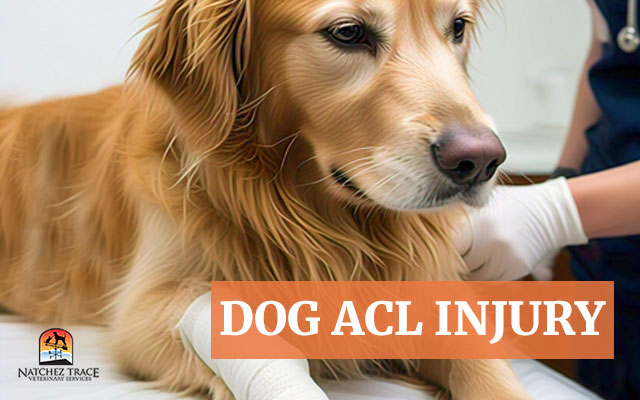Having Trouble With A Dog ACL Injury?
Caring for a dog with an ACL injury can be a daunting experience!
Specialists chant “Surgery! Surgery!” as your dog limps and your wallet screams in pain.
Make sure you do your research–you may have more options than you originally considered!
#1 Your Dog May Not Need Surgery
If your dog suffers from only a partial cruciate ligament tear, he or she may not need surgery.
You must visit a veterinarian to understand the severity of your dog’s ACL injury.
Sometimes limiting activity as the leg heals will resolve an ACL tear.
For partial tears, prolotherapy is often an excellent option instead of surgery.
#2 You May Have Options
If your dog needs ACL surgery, you still may have several options to choose from.
Not all vet clinics explain all of the options.
Some types of dog ACL surgery have more complications than other types of surgery.
Likewise, the complications of some types of surgery are much more drastic than the complications of other types of surgery.
You need to know all of the different options and possible outcomes available. More importantly, you also need to know how each choice relates to your dog’s particular situation.
Dr. Marc Smith makes a point to explain all of the options and details during every consultation.
#3 Physical Therapy After Dog ACL Surgery is a Must!
Physical therapy after surgery is mandatory for your dog to achieve the expected range of motion and use of his or her leg.
First, we teach you to do physical therapy so that you can perform the exercises at home with your dog.
Then you can start with a simple range of motion exercises right after surgery and move on to rebuilding exercises later.
Physical therapy training is a part of our clinic’s surgery package and incurs no additional cost to you.
#4 Your Dog May Tear the Ligament in The Other Leg
Statistics report that 50% of dogs that tear the one cruciate ligament will tear the opposite side sometime in their lifetime.
However, derived from years of in-clinic experience, Dr. Smith estimates the statistic to be actually more like 70%.
There are several options available to prevent your dog from tearing the other ligament.
#5 We Can Help You!
Dr. Marc Smith has treated hundreds of dogs with ACL injuries.
Many with a dog ACL surgery, some with other options.
Most importantly, if your dog suffers from an ACL injury or cruciate disease, please let us know!
We will work you in quickly for a consultation.
Powerful Tools to Help Your Dog’s Ligament Challenges
You can make many quick and easy changes at home to help you give your dog an edge on easing tendon and ligament challenges.
- Learn more about torn ligaments and cruciate disease.
- Provide joint support. PET | TAO’s Harmonize Joint is a blend of Eastern herbs and Western supplements working together to lubricate and restore your dog’s joints.
- Ease your dog’s discomfort naturally. PET | TAO’s Comfort is a blend of Eastern herbs and Western supplements to soothe your dog’s arthritic challenges to make him/her more comfortable.
- Try PET | TAO Freeze Dried Beef Liver Treats. According to TCVM, the liver controls tendons and ligaments. As few as 5-6 treats per day can make a huge difference in your dog’s tendon and ligament health!
- Try a Blood-building TCVM Diet. PET | TAO Zing dog food builds Blood. According to TCVM, Blood deficiency leads to ligament tears.
- Learn more about TCVM Herbal Remedies. Chinese medicine offers many amazing natural solutions for ligament and cruciate challenges. Some good examples are:








